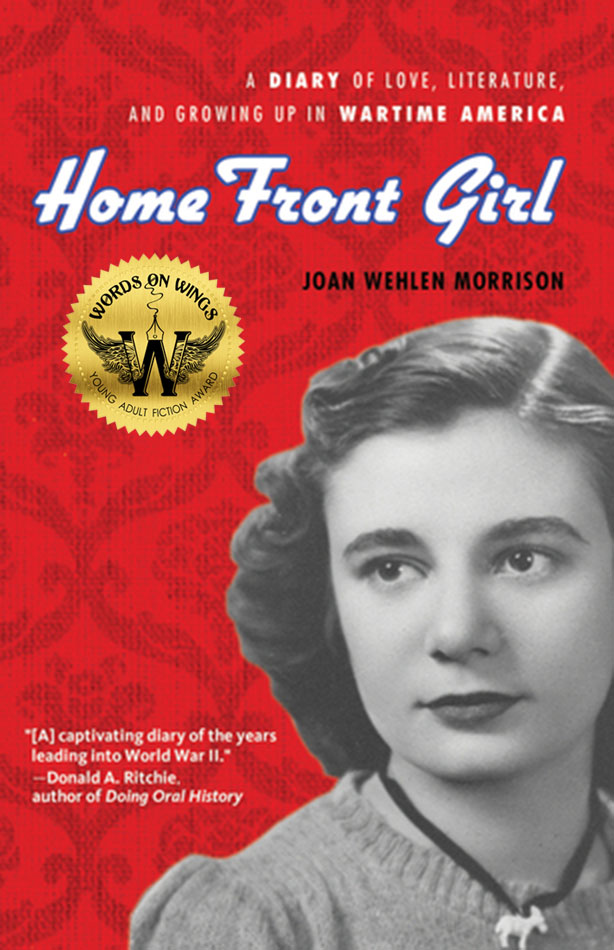
It really does take a village to edit poetry. My mother–Joan Wehlen Morrison–was an accomplished writer and teacher. It was only at her death that her diaries and poetry were found which she had written in the late 1930s and early 1940s as a teenage girl. I edited her diaries which were published in 2012 as the award-winning Home Front Girl: A Diary of Love, Literature, and Growing Up in Wartime America. My next project became editing her poetry, just published as Another Troy.
But editing poetry is not the easy task you might imagine. First of all, there were hundreds of pages of poetry. The beloved secretary–and dear fast friend–of my parents, Beverly Smith, typed up Joan’s poetry. Not only did she do that, Beverly lived with my dying father after the death of Joan. While he napped, she typed. They ate together with the indispensable aid of Nicki, my father’s delightful and loving health care worker. So my first tribute is to Beverly, a quasi-aunt to me and my brothers. Her cheer and indefatigable nature helped my grieving father in his final days.

Then there is my husband’s nephew, Leo. One of Joan’s poems, A.D. 79, is set the day Pompeii is destroyed. In the poem, a boy is reading Latin. My mother’s original cursive handwriting had to be teased out. Was that an “m” or an “n”? If so, what would it mean? “Non omnis moriar.” Leo, whose Ph.D. in Classics meant he was amply able to attend to my question, spent time laboring over the passage I scanned for him.
He wrote back:
“Non omnis moriar” is a famous bit of Horace, from Odes 3.30:
exegi monumentum aere perennius
regalique situ pyramidum altius,
quod non imber edax, non Aquilo impotens
possit diruere aut innumerabilis
annorum series et fuga temporum.
non omnis moriar…
“I have made a monument more lasting than bronze,
taller than the royal site of the pyramids,
which neither corrosive rain, nor the powerless North Wind,
nor the endless chain of years and the passage of time
Will be able to rip from its roots.
Not all of me will die...”
Horace 3.30 is one of the loci classici for expressions of poetic immortality in Latin. The text above is quoted from Wickham’s 1901 Oxford Classical Text edition.
Leo and I exchanged a number of emails along these lines, plus he was doing research to double check the passage for me. I couldn’t have edited this poem successfully without his invaluable and much appreciated help.

Given my mother’s reflection on the depressing aspects of life when she was seventeen after the World War II had begun, Leo wrote how she was “emo-Grandma”! This has brought many a chuckle to our family’s lives.
Finally, last but certainly not least: Claudia Cutter. She is a dear friend of my daughter, Sarah. And she, along with Sarah, read the master draft of Joan’s poems (200 pages — much longer than the 50 page chapbook now published) and plowed through the verse, dog-earring their favorites. An English major, I trust Claudia’s impeccable taste. She did this while visiting us in my the family house of my husband Jim in Hull, Massachusetts during spring break. It sounds like a time of trees budding and flowers blossoming, but a dramatic snow storm had just hit. I hope the verse warmed Claudia’s and Sarah’s hearts–their work certainly warmed mine!
Once the book was accepted for publication, I had to narrow down which poems would be included. Sarah, my son John, and Jim all read the poems, indicating their favorites (I did as well, of course). Then I collated their choices. If a poem was chosen by all of us, I was sure to include it. Then I proceeded from there. I wanted the reading experience to make an emotional narrative for the reader. This had to be considered, as well as my determination to have them appear chronologically.
So, it may seem “easy”–editing poetry. Take it from me–it isn’t. But with loving friends and family, the task is much easier. I thank them all with deep love and abiding affection and thanks. And, last but certainly not least, little Gwen made working on Joan’s poetry even more delightful–I still can see in my mind’s eye our little corgi watchfully protecting my mom in the kitchen of my childhood home.
















